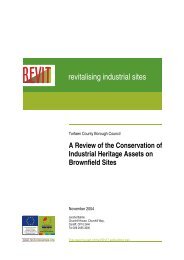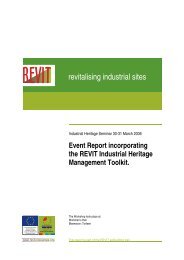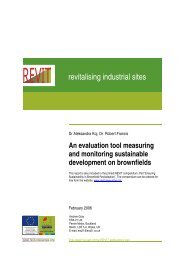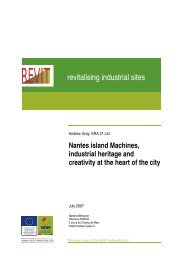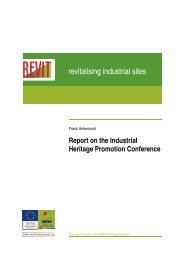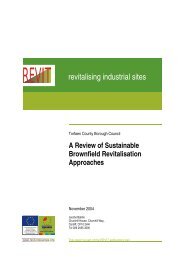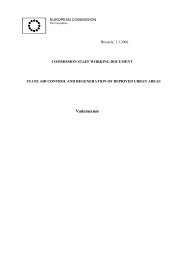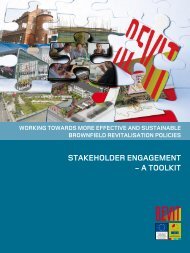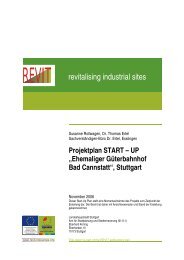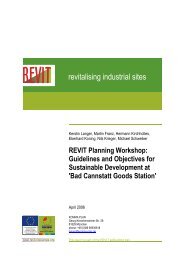Final announcement - REVIT
Final announcement - REVIT
Final announcement - REVIT
You also want an ePaper? Increase the reach of your titles
YUMPU automatically turns print PDFs into web optimized ePapers that Google loves.
organising committee<br />
Thomas Zügel (Chair), <strong>REVIT</strong> Lead Partner, Municipality of<br />
Stuttgart, Germany<br />
Dr. Thomas Ertel, <strong>REVIT</strong> Coordination-Team, Consultant,<br />
Germany<br />
Dr. Uwe Ferber, CABERNET, Consultant, STADT+, Germany<br />
Gritta Geffers, <strong>REVIT</strong> Lead Partner, Municipality of<br />
Stuttgart, Germany<br />
Programme committee<br />
Detlef Grimski (Chair), Federal Environmental Agency,<br />
Germany<br />
Jean Audouin, Agence Innovapresse Paris, France<br />
Peter Conradi, Architect, MdB 1972 - 1998, Germany<br />
Dr. Fabian Dosch, Federal Office for Architecture<br />
& Regional Planning, Germany<br />
Dr. Uwe Ferber, Consultant, STADT+, Germany<br />
Bertil Grundfelt, Managing Director Kemakta Konsult AG,<br />
Sweden<br />
Peter Morgan, Groundworks UK, United Kingdom<br />
Dr. Paul Nathanail, University of Nottingham, United<br />
Kingdom<br />
Dr. Francesca Neonato, PN Studio Milano,<br />
Italy<br />
REFINA<br />
The programme<br />
“Research for the<br />
reduction of land<br />
consumption and for promoting sustainable<br />
land management” funded<br />
by the BMBF, the Federal Ministry of<br />
Education and Research, is part of the<br />
German National Strategy for Sustainable<br />
Development. The German<br />
Federal Government has set a goal of<br />
reducing land consumption for settlement<br />
and transport to 30 hectares<br />
per day in 2020. In order to provide a<br />
scientifically reliable basis for decisions<br />
and measures, REFINA grants the<br />
development and testing of innovative<br />
concepts for the reduction of land<br />
consumption to achieve a multitude<br />
of goals such as e.g. protection of the<br />
environment and nature, economical<br />
growth, socially balanced housing, architectural<br />
urban quality, and mobility.<br />
organising & Programme committee<br />
Detlef Grimski, CABERNET, Federal Environmental Agency,<br />
Germany<br />
Maike Hauschild, Project Management Juelich (PTJ), Germany<br />
Gerard Jilleba, <strong>REVIT</strong>, Municipality of Hengelo, Netherlands<br />
Dr. Kate Millar, University of Nottingham, United Kingdom<br />
Dr. Paul Nathanail, CABERNET, University of Nottingham,<br />
United Kingdom<br />
Prof. Dr. Nico S. Groenendijk, University of Twente, Netherlands<br />
Euan Hall, Land Restoration Trust, United Kingdom<br />
Maike Hauschild, Project Management Agency Juelich,<br />
Germany (PTJ)<br />
Prof. Dr. Dagmar Petrikova, University of Bratislava,<br />
Slovak Republic<br />
Dr. Anna Starzewska-Sikorska, Institute for Ecology of<br />
Industrial Areas, Poland<br />
Dr. Paul Syms, English Partnerships, United Kingdom<br />
Dr. Derk van Ree, Stichting GeoDelft, Netherlands<br />
Martin Schamann, Federal Environmental Agency Vienna,<br />
Austria<br />
Ann Vega, United States Environmental Protection Agency<br />
(USEPA), USA<br />
CABERNET is a European<br />
multi-stakeholder expert network<br />
– originally funded by the EC –<br />
that is working to enhance the<br />
rehabilitation of brownfield sites<br />
within the context of sustainable<br />
development of European cities.<br />
CABERNET explores new management<br />
strategies, innovative<br />
tools and stimulates co-ordinated<br />
research activities. CABERNET is<br />
jointly organised by the University<br />
of Nottingham and the Federal<br />
Environment Agency.<br />
Presented by<br />
<strong>REVIT</strong> – In every country<br />
and in almost every city of<br />
Europe, there are brownfield<br />
areas which need to be revitalised<br />
in order to preserve<br />
or improve the quality of urban living conditions.<br />
The revitalisation of brownfield sites<br />
may enhance coherent urban development,<br />
but can also create new employment and<br />
stimulate the local economy. Last but not<br />
least, revitalising brownfields for a variety<br />
of future uses preserves greenfield sites and<br />
prevents the growing consumption of land.<br />
Therefore <strong>REVIT</strong> strives to achieve a higher<br />
acceptance and better image for revitalised<br />
brownfield sites by testing their own<br />
models and tools on the local project areas<br />
of each partner and reporting best practice<br />
examples in this context to other cities and<br />
regions in Europe.



